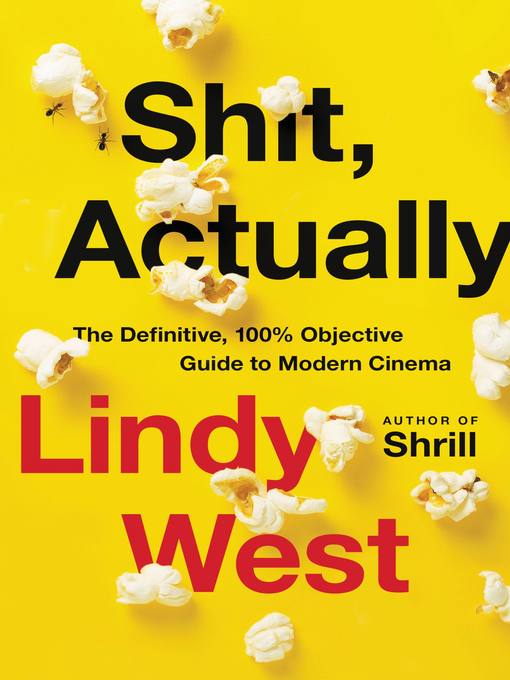Review by Booklist Review
Queen of keenly observed, hilariously rendered cultural criticism, West (The Witches Are Coming, 2019) offers this delicious distraction from reality. In what she calls an "extremely stupid book," West expands upon her beloved Jezebel essays on cinema and reviews nearly two dozen cult-classic films, examining how and why they were so special to audiences, all through the lens of 2020. West starts with her favorite, The Fugitive (she tried to title this book The Fugitive is the Only Good Movie), followed by side-splitting summaries of Love Actually, The Shawshank Redemption, Titanic, Top Gun, Bad Boys II, Forrest Gump, Twilight, Garden State, The Lion King, American Pie, and more, leaving no genre out. Infused with West's commentary, which is colored by her rewatching during the COVID-19 lockdown, what emerges is a cathartic, joyful exploration of entertainment. West guides us through art and artists that have been tainted by time and progress. She calls out what is wrong, and offers insight for how these films should be seen in the present. And in true West form, she reads like your smartest, funniest, and warmest friend. A perfect blend of substance, escapism, and laughter--a gift from West to the rest of us.
From Booklist, Copyright (c) American Library Association. Used with permission.
Review by Library Journal Review
Based on her series of essays for Jezebel, on rewatching successful films to see if they stand the test of time, this latest by West (Shrill; The Witches Are Coming) explores the longevity of films, especially those that later became cultural phenomena. The author admits that The Fugitive (1993), in which the hero is also the villain, is her all-time favorite, and she proceeds to judge other films by that standard. She thoughtfully considers rewatching works by beloved celebrities who have later failed us and liking imperfect movies that mean something to us. This leads to a reexamination of her fondness for classics such as Top Gun (1986), Speed (1994), and Face/Off (1997). As indicated by the title, West reserves the most dislike for Love Actually (2003) and does not shy away from profanity, saving it for movies that don't hold up, such as American Pie (1999). Some of these essays were previously published, while others are original to this work. Though the author clearly states that the book isn't meant to be comprehensive, her brief entries may leave readers wanting more. VERDICT This irreverent look at film criticism will be popular among West's many fans and may provide insight for readers grappling with liking flawed films.--Stephanie Sendaula, Library Journal
(c) Copyright Library Journals LLC, a wholly owned subsidiary of Media Source, Inc. No redistribution permitted.
Review by Kirkus Book Review
Revisiting her early career as an acid-tongued film critic, New York Times columnist West deconstructs 22 blockbusters in this nostalgic, laugh-out-loud romp. In the introduction, the author labels this collection "silly," a frivolous work initially conceived as a ray of light for a fraught America. Despite being released into an irreparably altered world--not just due to the pandemic, but also "the demoralizing grind of public life under Donald Trump"--these breezy essays fulfill that promise. They are warmhearted, acutely self-aware, and surprisingly timely, providing insight into modern society through movies first sold on VHS. West rates each film against the Harrison Ford vehicle The Fugitive ("the only good movie"), leaping across genres, from Jurassic Park to Garden State to The Shawshank Redemption. Whether she is excoriating Love, Actually ("the apex of cynically vacant cash-grab sentimentality"), describing how the "best thing" about the Harry Potter series is that she loves to hate it, or discussing whether or not The Lion King's Mufasa has any actual parenting skills beyond his deep voice, West uses hindsight to gain critical distance and set up her sidesplitting one-liners. The book's breadth of targets allows for a wide canvas. For example, an essay on Reality Bites examines West's own teenage lusts and the dearth of realistic female role models in film while a treatise on The Santa Clause looks at the 1990s humor triumvirate of "lawyer jokes, hatred for psychiatrists, and your divorced parents getting back together." A number of the pieces were previously published online, and some of the jokes may seem crude to West neophytes. But the author uses frivolity and humor as entry points to discussions about racism, sexism, and our tendency to overlook the damage a story can do if it keeps us entertained. Other targets include Rush Hour, American Pie, Titanic, and The Rock. Like catching up with a dear and funny friend, this insightful and irreverent book is a soothing balm for turbulent times. Copyright (c) Kirkus Reviews, used with permission.
Copyright (c) Kirkus Reviews, used with permission.


